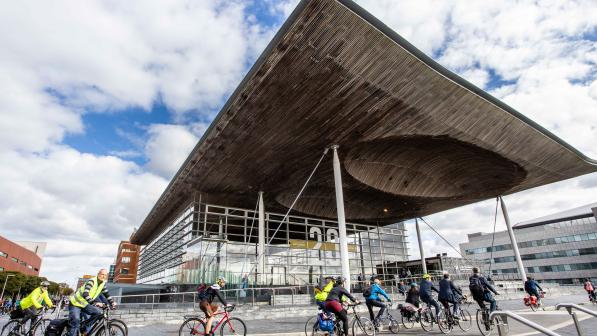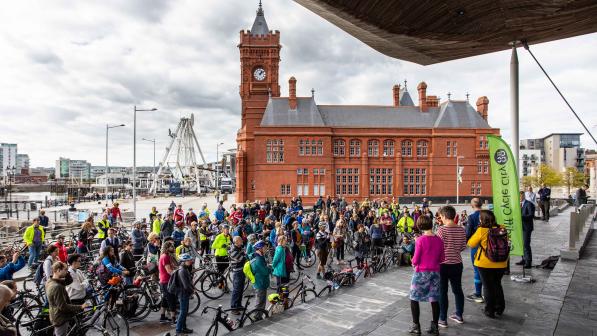Will the Welsh transport strategy deliver on active travel and climate change?

So near, and yet so far
I venture to say that most cycle campaigners have, at least once, felt their joy ebb away when a strategic vision struggles out of the factory with vital parts on endless back order or missing altogether.
I'm sad to say that this is exactly what’s happened in the case of the delivery plan for Welsh Government’s Llwybr Newydd: the Wales transport strategy 2021.
What is Llwybr Newydd?
Llwybr Newydd sets out Welsh Government’s 20-year ambitions for transport and its priorities for five years.
Broadly speaking, Cycling UK and its expert campaigning volunteers in Wales liked the draft and, although not every recommendation of ours made it into the final version (March 2021), the charity welcomed much of it, especially its core imperative to place “people and climate change at the front and centre of our transport system.”
“This is something that we have to do,” the responsible ministers go on to say. “The climate emergency is one of the biggest defining issues of our time. If we are going to protect the lives of our children, we need to achieve net zero by 2050.
“And in order to do that, we need to change the way we travel. We need fewer cars on our roads, and more people using public transport, walking or cycling.”
Agreed.
What’s the problem, then?
When Welsh Government first drafted Llwybr Newydd and consulted the public about it, Cycling UK pointed to its “lack of clarity on delivery”, and urged them to address this deficiency.
So, here’s the question: does the draft National Transport Delivery Plan (NTDP), published this summer, assure Llwybr Newydd will live up to its title which, in English, means "new path"?
And here’s the answer: no.
Praise where it's due
By no means does the NTDP disappoint Cycling UK and its key volunteers in Wales through and through, though.
The charity appreciate several aspects of it, including, for instance: plans to transform the image of active travel; the approach to behaviour change; news of a much-needed National Travel Survey for Wales; introducing Bikeability cycle training; encouraging e-bikes and e-cargo bikes; integrating active travel with public transport; and moves to expand cycle storage.
And it's certainly not forgotten that Wales has already decided to do something exemplary for road safety and active travel that no other UK nation has yet carried through, namely adopting a national default 20 mph speed limit on restricted roads.
Now for the disappointment
The first question on the form supplied for Cycling UK's response to the draft NTDP asked: “Do you think the plan will have a positive impact on the Welsh Government targets for creating modal shift to more sustainable forms of transport?”
After a long, hard think, the charity felt we had no choice but to tick the ‘very negative’ box.
As it stands, the NDTP can’t have a positive impact on Wales’ modal shift targets because it falls short on delivery, detail, definition, timescale, urgency, long-term funding, governance, monitoring, accountability and collaboration with stakeholders.
It also presents with some glaring gaps on inclusion, equality, health, education, schools, pedicabs, cycle parking at bus stops and links to the rights of way network (among others).
I won’t elaborate here on all these issues because you can read all about them in our full response to the consultation attached below – the long-term funding angle being particularly knotty and wide-ranging – but will instead briefly pick out three particular deficiencies.
Not delivering on delivery
Overall, Cycling UK think the draft NTDP overuses terms such as “explore”, “consider”, “investigate”, “look at/for”, “encourage” or “support”, and is woefully short of “will deliver”. This is not only surprising for a “delivery” plan which claims to be “turning strategy into action” but deeply worrying.
Despite Llwybr Newydd’s promise, the draft Delivery Plan does not inspire confidence that Welsh Government will actually deliver. There needs to be definition and timescales, and Cycling UK hopes that the Government will be shocked into changing the draft, realising that it currently does nothing to address its own targets on greenhouse gas emissions
Gwenda Owen, Cycling UK engagement officer in Wales
Gwenda Owen, Cycling UK's engagement officer in Wales said of the strategy: "Despite Llwybr Newydd’s promise, the draft Delivery Plan does not inspire confidence that Welsh Government will actually deliver. There needs to be definition and timescales, and Cycling UK hopes that the Government will be shocked into changing the draft, realising that it currently does nothing to address its own targets on greenhouse gas emissions."
Liquidising the definition of the ‘Sustainable Transport Hierarchy’
The ‘sustainable transport hierarchy’ (STH), already adopted by Welsh Government in its planning policy, means prioritising walking and cycling, then public transport over the private car. It does not mean, as the draft NTDP claims under ‘Useful terms’, giving “priority to maintaining, managing and future proofing existing infrastructure.”
The difference between these two definitions is not only chasmic, but dangerous. The Government put active travel at the top of the hierarchy for good reason, and Cycling UK is alarmed to see “existing infrastructure” sloping onto the apex instead.
To keep faith with other important documents, including Llwybr Newydd itself, the final version of the NTDP must undo this vastly un-useful, not to say peculiar, change.
Glossing over details and timescales
The NTDP’s Annex 2 outlines the timescale for a series of programmes, projects and interventions mentioned in the body of the document.
Too much of it, however, is vaguely dated and it’s sometimes a challenge to identify which project is being described, or if it is being described at all.
Regrettably, it’s the ‘Active Travel’ section that suffers most from this, along with some associated measures critical to improving conditions for (and perception of) walking and cycling, modes that the Government says it wishes to encourage above all.
By way of example, the annex gives a date range of 2022 to 2024 for updating the Road Safety Framework (RSF), but this isn't nearly urgent enough.
After all, a robust and up-to-date RSF is crucial to underpinning active travel’s rightful spot at the top of the STH (see above): both walking and cycling are safer than many people think, but nevertheless vulnerable. For their sake, and in the interests of the Government’s vision for “A continued reduction in the number of people killed and seriously injured on Welsh roads, with the ultimate aspiration of no fatalities”, Wales shouldn’t be expected to wait much longer for a refreshed RSF – particularly as the last one expired in 2020!
Something else that’s been on the waiting list, but for even longer – about a decade now – is the promised “promotional toolkit” to help local authorities promote active travel. I'm not entirely sure if this is what Annex 2 means by “Develop travel plan guidance and toolkit”, but I am in no doubt that local authorities need the toolkit urgently.
Even worse, perhaps, an undertaking to update TAN 18 (technical advice on transport issues to consider when developing planning policy and assessing planning applications) doesn’t even appear in the Annex, although the NTDP says elsewhere that this is going to happen “in the next 5 years.”
In the next five years? That’s simply not good enough. If the Government really wants, as it says it wants, to ensure that “…new developments are designed to be walking and cycle-friendly from the outset”, it's got to review TAN 18 now.
Climate change
Finally, with COP27 coming to a close this week, we can’t ignore the impact that decision-making on transport has on greenhouse gas emissions (GHG).
Road transport is a significant emitter of GHG in both the UK as a whole and in Wales, and cars are responsible for most of it.
To be fair, no one can say that Welsh Government is ignoring climate change – the pioneering Well-being of Future Generations (Wales) Act 2015, legally binding net zero targets and declaration of a climate emergency in 2019 are all cases in point.
Also to be fair, Llwybr Newydd doesn’t ignore the threat either and nor even does the draft NTDP.
But we’re so near, yet so far because there is no way that the NTDP, as drafted, will deliver on climate change. And it’s not just us who are saying that.
Courtesy of its accompanying Integrated Sustainability Appraisal report (ISA), we learn that in all likelihood the NTDP’s impact on greenhouse gas emissions will be almost undetectable. We’re talking status quo here at best, not “new path”.
For this reason, at the very least, the NTDP must be overhauled, strengthened and, as a result, change course so that Llwybr Newydd’s vision for transport and net zero can be delivered throughout Wales by a smoothly functioning and sustainable fleet of measures that are genuinely up to the job.
If not, the tantalising prospect of “… fewer cars on our roads and more people using public transport, walking or cycling” will, sadly, ebb away.




